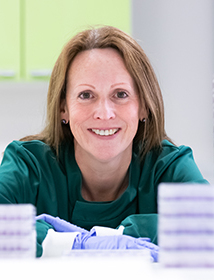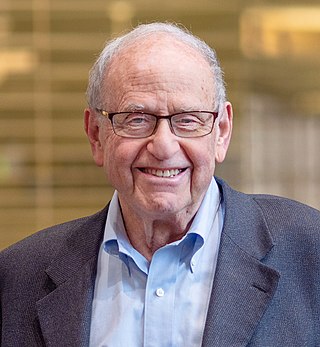Related Research Articles

Walter Ian Lipkin is the John Snow Professor of Epidemiology at the Mailman School of Public Health at Columbia University and a professor of Neurology and Pathology at the College of Physicians and Surgeons at Columbia University. He is also director of the Center for Infection and Immunity, an academic laboratory for microbe hunting in acute and chronic diseases. Lipkin is internationally recognized for his work with West Nile virus, SARS and COVID-19.
Hon. Richard Tedder FRCP is an English virologist and microbiologist, was head of the Department of Virology at the University College London Medical School, and worked as virologist at Public Health England

Andrew C Hayward MBBS, BSc, MSc, DTMH, MD, FPHM, is professor of infectious disease epidemiology and inclusion health research at University College London.
Peter John Morland Openshaw, is a British clinician and scientist specialising in lung immunology, particularly defence against viral infections. He trained in lung diseases and undertook a PhD in immunology before establishing a laboratory at St Mary's Hospital Medical School. He created the academic department of Respiratory Medicine and the Centre for Respiratory Infection at Imperial College and was elected President of the British Society for Immunology in 2014.

Wendy Sue Fox is a British virologist. She is currently head of Department of Infectious Disease and chair in Influenza Virology at Imperial College London. She leads a team of scientists studying the influenza virus and its physiology and morphology to discover novel vaccines. In particular, they are trying to understand more about influenza virus mutations, and how they can allow scientists to create new vaccines against possible flu pandemics.
Guan Yi is a Chinese virologist. In 2014, he was ranked as 11th in the world by Thomson Reuters among global researchers in the field of microbiology. He obtained his PhD in microbiology at the University of Hong Kong and is now a professor of microbiology at his alma mater. His research on the viral respiratory disease SARS helped the Chinese government avert the 2004 outbreak of this disease. He is the current director of the State Key Laboratory for Emerging Infectious Diseases University of Hong Kong. In early 2017, Guan warned that the H7N9 influenza virus "poses the greatest threat to humanity than any other in the past 100 years".

Neil Morris Ferguson is a British epidemiologist and professor of mathematical biology, who specialises in the patterns of spread of infectious disease in humans and animals. He is the director of the Jameel Institute for Disease and Emergency Analytics (J-IDEA), director of the MRC Centre for Global Infectious Disease Analysis, and head of the Department of Infectious Disease Epidemiology in the School of Public Health and Vice-Dean for Academic Development in the Faculty of Medicine, all at Imperial College London.

The COVID-19 pandemic in the United Kingdom is a part of the worldwide pandemic of coronavirus disease 2019 (COVID-19) caused by severe acute respiratory syndrome coronavirus 2 (SARS-CoV-2). In the United Kingdom, it has resulted in 24,311,933 confirmed cases, and is associated with 211,155 deaths.

Christian Heinrich Maria Drosten is a German virologist whose research focus is on novel viruses (emergent viruses). During the COVID-19 pandemic, Drosten came to national prominence as an expert on the implications and actions required to combat the illness in Germany.
Maria DeJoseph Van Kerkhove is an American infectious disease epidemiologist. With a background in high-threat pathogens, Van Kerkhove specializes in emerging and re-emerging infectious diseases and is based in the Health Emergencies Program at the World Health Organization (WHO). She is the technical lead of COVID-19 response and the head of emerging diseases and zoonosis unit at WHO.
The Scientific Advisory Group for Emergencies (SAGE) is a British Government body that advises central government in emergencies. It is usually chaired by the United Kingdom's Chief Scientific Adviser, currently Sir Patrick Vallance. Specialists from academia and industry, along with experts from within government, make up the participation, which will vary depending on the emergency. SAGE gained public prominence for its role in the 2020 COVID-19 pandemic in the United Kingdom.

Bonnie J. Fraser Henry is a Canadian physician and public servant who has been the provincial health officer at the British Columbia Ministry of Health since 2014. Henry is also a clinical associate professor at the University of British Columbia. She is a specialist in public health and preventive medicine, and is a family doctor. In her role as provincial health officer, Henry notably led the response to COVID-19 in British Columbia (BC).

Sir Jonathan Stafford Nguyen-Van-Tam is a British healthcare professional specialising in influenza, including its epidemiology, transmission, vaccinology, antiviral drugs and pandemic preparedness.

Arnold Monto is an American physician and epidemiologist. At the University of Michigan School of Public Health, Monto is the Thomas Francis Jr. Collegiate Professor of Public Health, professor of epidemiology, and professor of global public health. His research focuses on the occurrence, prevention, and treatment of infectious diseases in industrialized and developing countries' populations.
Christophe Fraser is a professor of Infectious Disease Epidemiology in the Big Data Institute, part of the Nuffield Department of Medicine at the University of Oxford.
William John Edmunds is a British epidemiologist, and a professor in the Faculty of Epidemiology and Population Health at the London School of Hygiene & Tropical Medicine.
Sir Peter William Horby is a British physician, epidemiologist, Moh Family Foundation Professor of Emerging Infections and Global Health, and Director of the Pandemic Sciences Institute at the University of Oxford. He is the founder, and former director of the Oxford University Clinical Research Unit in Hanoi, Vietnam which was founded in 2006. In 2014, Horby established the Epidemic Research Group Oxford (ERGO). ERGO incorporates a number of international projects such as the European Commission funded PREPARE, the African coaLition for Epidemic Research, Response and Training (ALERRT), and the International Severe Acute Respiratory and emerging Infection Consortium (ISARIC). Since 2016, Horby has been chair and executive director of ISARIC.
Maria Caterina Zambon FMedSci FRCPath, is a British virologist, director of reference microbiology for Public Health England, and a professor.
Robert William James Dingwall is a British sociologist and academic, specialising in medical sociology. He has been Professor of Sociology at Nottingham Trent University since 1990. His research is on the interdisciplinary study of law, medicine, science and technology.

Müge Çevik is a physician who is an infectious diseases researcher and science communicator at the University of St Andrews. Her research considers HIV, viral hepatitis, emerging infections and tropical infections in developing countries. During the COVID-19 pandemic, Çevik was an advisor to the Chief Medical Officer of Scotland and the World Health Organization, and is a member of New and Emerging Respiratory Virus Threats Advisory Group - an expert committee of the UK Department of Health advising Scientific Advisory Group for Emergencies.
References
- 1 2 "New and Emerging Respiratory Virus Threats Advisory Group". GOV.UK. Retrieved 18 July 2020.
{{cite web}}: CS1 maint: url-status (link) - ↑ Ruth Parry (6 July 2016). "The New and Emerging Respiratory Virus Threats Advisory Group (NERVTAG) - 1st Annual Report December 2014-December2015". New & Emerging Respiratory Threats Advisory Group. Retrieved 27 December 2020.
NERVTAG meeting 19 December 2014: As this was the first meeting of the group the Terms of Reference were agreed...
- ↑ "NERVTAG meetingon SARS-CoV-2 variant under investigation VUI-202012/01". New and Emerging Respiratory Virus Threats Advisory Group. 18 December 2020. Retrieved 27 December 2020.
- ↑ Peter Horby, Catherine Huntley, Nick Davies, John Edmunds, Neil Ferguson, Graham Medley, Calum Semple (11 February 2021). "NERVTAG note on B.1.1.7 severity for SAGE 77". New and Emerging Respiratory Virus Threats Advisory Group. Retrieved 14 February 2021.
{{cite web}}: CS1 maint: multiple names: authors list (link)